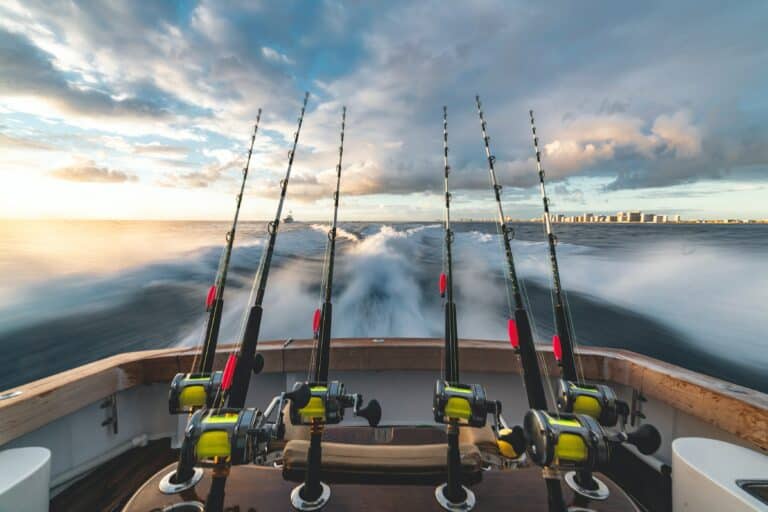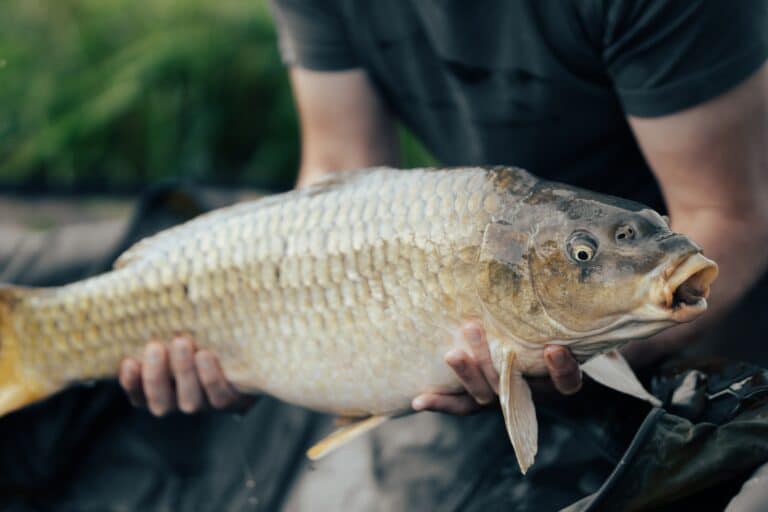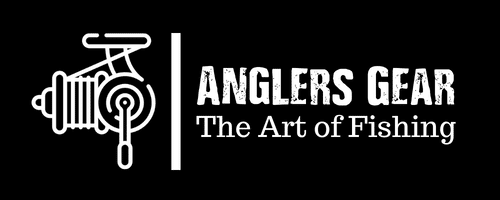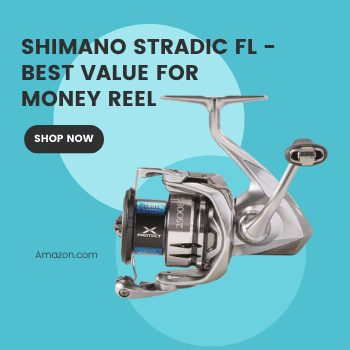What is Coarse Fishing?
Skip To Save Time
What is Coarse Fishing - Anglers Gear's Knowlage Base
If you are already an avid angler you might be looking at something new to try and coarse fishing is a great option. You might already have tried fishing for salmon, trout, or saltwater fish and be looking for a new challenge. Coarse fishing is a very popular pastime so if you haven’t tried fishing before then you should give coarse fishing a try.
Coarse fishing involves catching fish that aren’t eaten. Typically the fish are caught and then released. Popular fish for coarse fishing is carp and perch among other freshwater fish.
Coarse fishing is closely associated with match fishing because many match fishing competitions involve catching the biggest carp which is of course a ‘rough’ fish or non-salmon. Learning to coarse fish is a great way to get you ready for match fishing, especially if you are planning on becoming a professional angler.
Coarse fishing involves fishing on freshwater, most often a lake but sometimes a river and it comes with many challenges! There are lots of different techniques to try and many commercial fishing spots will have their own rules on coarse fishing that you will have to follow. There’s a lot to learn with coarse fishing but if you have already tried fishing before you will likely relish the challenge.

What is Coarse Fishing?
Coarse fishing is just fishing for a freshwater fish that isn’t eaten or a game fish. So not salmon or trout. Some examples of coarse fish include carp, perch, chub, or bream. Coarse fishing involves using the appropriate fishing gear to catch rough fish, it is a popular type of fishing for match fishing as well.
Commercial fishing lakes are great spots for coarse fishing as they are generally well-maintained and often have good facilities to make for a relaxed and enjoyable day of fishing. You can, of course, enjoy coarse fishing in a natural setting either freshwater lakes or rivers.
The advantage of coarse fishing in a natural setting is that the fish are less likely to be used to the bait but it will take time and experience to know where the fish are likely to be. With a commercial fishing lake, you are more likely to find the fish but will need to offer a variety of baits or choose the right one to catch a bite.
A really exciting option if you get more skilled at coarse fishing is to take part in match fishing and you’ll probably find that the commercial fishing spot you attend runs these regularly. There can be some great prizes up for grabs and it is also a great way to meet and socialize with other anglers who enjoy coarse fishing as well.
Why is it Called Coarse Fishing?
It is called coarse fishing because of the type of fish that are caught. These fish are also called rough fish. The term coarse fishing is used to differentiate from fishing for edible fish such as salmon and trout. Course fishing indicates that you are fishing for freshwater fish that are not generally eaten such as chub, bream, or carp. Coarse fish are generally fished for in lakes or slow rivers. This may be a commercial or natural setting depending on your preference.
If you plan to attend a fishing tournament for coarse fishing then you are likely going to be catching carp. This is a popular pastime and the aim is often to catch the heaviest carp or the most carp in a certain amount of time. Other popular fish to catch as a coarse angler include pike and perch. The fish caught will depend on your location around the world.
What Fish Species are Caught in Coarse Matches?
In coarse fishing matches, coarse or rough fish are caught. These are freshwater fish that are not eaten such as perch, bream, tench, and carp. Sometimes large predatory fish like pike are caught. Coarse fishing matches may have different categories to gain points in. For example, points could be won for catching the most species, the largest of a species, or even the highest number caught of one species.
These fish are different from game fish, or fish that are eaten such as salmon or trout. Not all match fishing is coarse fishing. Some matches and tournaments are held in saltwater so if you enjoy coarse fishing and would like to compete, don’t assume that the fishing match is for coarse fishing.
Coarse fishing is a popular pastime at commercial lakes. These are often specifically stocked with fish for coarse fishing so you will find this an accessible way to get into the sport. You are more likely to catch coarse fish in a commercial fishing spot, especially if they are well stocked. And because coarse fish are generally caught and released you might find some large specimens. Though do check your local laws on which fish can be released if you are fishing in a natural fishing spot because this can vary by location.
You’ll also need to check about fishing licenses and seasonal fishing rules for your location if you are going to be fishing in a natural fishing spot. You might only be able to catch fish of a certain length for example.
What Equipment do you Need to go Coarse Fishing?
For coarse fishing, you will need the basic set of fishing gear with a few additional extras. You’ll need a rod, reel, line, tackle, bait, net, and bucket to begin with. You might also wish to try pole fishing. You’ll need a fly fishing rod, float rod, or feeder rod, and one that will get you some distance as some coarse fish can be quite elusive. A professional rod is a good choice as you know that there is the expertise behind the rod. Some are labeled as match fishing rods which is a good choice as well as for coarse fishing.
You might need to try some different types of rods, tackle and bait. So some fish will be feeding on the bottom and you’ll need a feeder rod or you might want to try to attract the fish mid-water with a float. There are lots of options for bait including commercial feeder pellet and mix to maggots. Coarse fish can get used to certain bait and stay away from it, especially at a commercial fishing lake so you’ll need to be able ta adapt your technique. Especially if you hope to eventually compete in match fishing.
You’ll need to also make sure you have all the essentials for a comfortable day fishing. This will likely include a chair such as a carp chair or a fishing box to sit on. Many fishing chairs have helpful additional features such as rod or cup holders.
You’ll want to make sure you’re dressed for coarse fishing with waterproof gear. You’ll also want to have layers to keep you warm and sunglasses, a hat, and sunscreen to protect you from the sun’s harmful UV rays.
If you’re coarse fishing at a commercial fishing site then they will likely have food and drink facilities but you might want to pack plenty of drinks and snacks to make sure you have plenty of sustenance with you. Remember to take some cash encase you need it for parking or to pay for your day at a commercial site, although you may be able to pay online in advance.
Try not to take too much equipment when you start coarse fishing, you don’t want to be overwhelmed and might meet local anglers who can give you tips on the best techniques for the location.
When is the Coarse Fishing Season?
This will depend on where you live so check out the local fishing legislation in your area. This is important if you plan to fish in a natural setting. Though at commercial coarse fishing sites, you can often fish year-round.
What is a Good Coarse Fishing Tackle?
A wide range of fishing tackle may be suitable for coarse fishing because it includes such a wide variety of species of fish. Check out which fish are prevalent in your area to get an idea of what you will need. Joining a local angling group can be a great way to get started and find out this type of information.
What is a Good Lure for Coarse Fishing?
There are lots of options when it comes to lures and baits. You will find that you will need to be adaptable in your technique. If the fish get spooked at the mid-level you might need to switch to tackle that attracts fish feeding at the bottom.
There is a wide range of bait that can be used from maggots to bread sweetcorn and commercial feed that you may need to mix up in large quantities. Most anglers recommend taking more bait with you than you’ll need just to make sure you don’t run out.
In terms of jigs, you will need to check the specifications of your local commercial fishing spot as they may or may not allow the use of jigs.
What are some Best Tips for Coarse Fishing Beginners?
Here are 10 top tips for coarse fishing.
1. Get to know your fishing spot
Whether you’ve chosen your local natural river and you’re catching chub or you decide to try out catching carp at your local commercial fishing spot then you need to get to know your fishing spot. Especially if you plan to go pro. A good angler will be able to compensate for a poor swim or peg especially if there aren’t many spaces available when you turn up on a busy day.
2. Practise
You can’t expect to excel at coarse fishing straight away even if you do have some good luck, to begin with. You’ve got to be prepared to put in the hours of practice it takes to become a skilled angler and this involves trying out lots of different techniques and baits for example.
3. Check out YouTube
There are lots of fishing videos and tutorials online that are both informative and inspiring. Don’t dismiss those by brands outright because they often hire experienced, pro anglers to demonstrate their skills and are sponsored to do so. They are often hosted by pros who have got there with their skills.
4. Practise lots
Get lots of practice under your belt, especially if you want to go pro at match fishing. If you focus on gaining experience in coarse fishing you’ll be able to enter coarse fishing tournaments. If you do decide to try coarse fishing at matches then remember to have a sports-like attitude.
5. Be prepared
Make sure you have everything you need planned and ready. Especially if you need to prepare the bait. There’s nothing worse than turning up, unloading all your gear, and realizing you’ve forgotten an essential piece of kit. You might be lucky on a commercial fishing spot if they’ve got a supplies shop, or someone might have a spare. However, if you’re out coarse fishing in natural waters and you forget a vital piece of gear then you might have to cut short your fishing trip!
6. Stay well Hydrated
Remember to pack plenty of supplies such as drinks and snacks to keep you going throughout the day. You’ll want some high-energy snacks to keep you going.
7. Socialize
Coarse fishing, especially in a commercial swim spot is a great way to meet other anglers who enjoy your hobby. Socializing with other anglers is a great way to find out about other tips and techniques that you could consider trying to enhance your skills.
8. Have fun!
Don’t forget to relax and enjoy yourself. Coarse fishing can have moments of high adrenaline, especially when you land your largest catch ever! But it’s also a very relaxing hobby so enjoy the time unwinding in nature.
9. Try getting the family involved
Many young people enjoy fishing so consider inviting the whole family. If you have children or grandchildren see if they would like a go at coarse fishing and pass on your expertise to the younger generations.
10. Research fishing seasons
Make sure you understand the fishing seasons because this can affect the fish available in your area, the age of the fish you expect to catch, and other aspects. Knowing the fish you are trying to catch will be a great help to you. You may need to choose a different fish to focus on following your research.
What are the Best Places to Coarse Fish?

Well coarse fish are abundant throughout the Northern Hemisphere so you’re going to have plenty of options for coarse fishing in natural locations across Europe and North America. You’ll need to check out what fish are available in your local fishing places and see if you need a license to fish or if there are any local restrictions. These may be seasonal.
A great place to start coarse fishing is at a commercial fishing lake. These lakes are going to be well stocked and managed. There can be a challenge in that some coarse fish, like carp in particular can get used to certain bait if they have been caught before. But despite this, there should still be plenty of opportunity to catch fish and a trip to a local commercial fishing spot is unlikely to disappoint once you get the hang of it.
FAQs
Whether you’re completely new to fishing or an experienced angler looking to try something new then you might still have some questions about coarse fishing. Here we answer some common questions about coarse fishing and present the current opinion to you.
Is trout a coarse fish?
No, trout is not a coarse fish. It is considered an edible fish, like salmon, and is often called a game fish. Trout are often fished with a fly fishing rod and lure.
What are the different types of fishing?
There are many different types of fishing and the terms can be interchangeable. You can split fishing into saltwater and freshwater fishing. You can define it by the type of fish such as game or coarse fishing. Or you can define it by the style of fishing such as match fishing at tournaments or recreational fishing for fun. You can also define the type of fishing by the method or type of rod and tackle used, such as trolling or fly fishing. Finally, you might wish to define your style of fishing by location such as kayak, or boat fishing.
What type of fish is coarse?
Coarse fish are freshwater fish that are generally not eaten or game fish. So not salmon or trout. Examples of course fish include chub, perch, carp, and pike. They are often caught and released although this depends on your location.
Coarse fish are often the species of fish caught at match fishing. If you decide to fish in a commercial spot then you are likely to be fishing for coarse fish. Although course fish do make a great option for natural fishing.
What is the easiest type of fishing?
Spin fishing is generally considered to be the easiest type of fishing to try because you just need a rod, bait on a line, and the spinning reel. However, most types of fishing are easy once you get the technique right. Fishing for small fish in a stream with a fly fishing rod can be a great way to start once you get the hang of it.
You’ll need to do some research to get coarse fishing right, especially in your area. But once you get the hang of it you’ll see why it’s such a popular recreational activity.
Is pike fishing coarse?
Yes, pike fishing is coarse fishing because it is a freshwater fish that is not universally eaten. Although pike is eaten in some places around the world it is a very bony fish and is generally considered to be a coarse fish.
This large predatory fish can be found in North America and Europe. They are fish that can be found in slow-moving water and lakes particularly like weedy or rocky spots. Smaller pike can e found on the lake edges.
Can you eat coarse fish?
Generally, coarse fish are not eaten. The aim of coarse fishing is to catch and then release the fish back into the water to ensure future stocks. This is especially important to preserve native species and maintain a balanced ecosystem. Although check your local rules as some states prevent you from returning some fish that are caught.
If you are fishing in a commercial lake you will need to follow their rules and this will likely involve releasing the fish back into the water to secure future stock levels.
Some coarse fish can be eaten such as pike but these are not for everyone.
Can you coarse fish in saltwater?
No coarse fishing is a term used for freshwater fishing, although some coarse fish may be found in brackish water, like pike in a few places. Coarse fishing refers to the group of freshwater fish that are caught in coarse fishing. These ‘rough’ fish are found in freshwater lakes and rivers, not in the ocean.
Match fishing often involves coarse fishing but match fishing can take place in the ocean as well as match fishing tournaments involve many different types of fishing.
Final Word: What is Coarse Fishing?
Coarse fishing is a type of fishing that involves catching coarse fish with a rod or pole. These are freshwater fish that are typically not eaten like chub, bream, perch, and carp. Generally, this type of fishing does not include either trout or salmon, or saltwater fish.
It is a popular recreational activity around the world and can be both very relaxing and very exciting at times. Coarse fishing can be enjoyed in both natural and commercial fishing spots and is often the type of fishing at fishing matches and tournaments.
There are lots of options for rod, tackle, and bait. You’ll need to do your homework and try different techniques to get it right for catching the coarse fish in your area. You may also need a license or may have some seasonal fishing restrictions so check these out as well.
If you are already an avid angler and wish to try something new, then coarse fishing is an exciting challenge! Do you already enjoy coarse fishing or is this something you would like to try?



